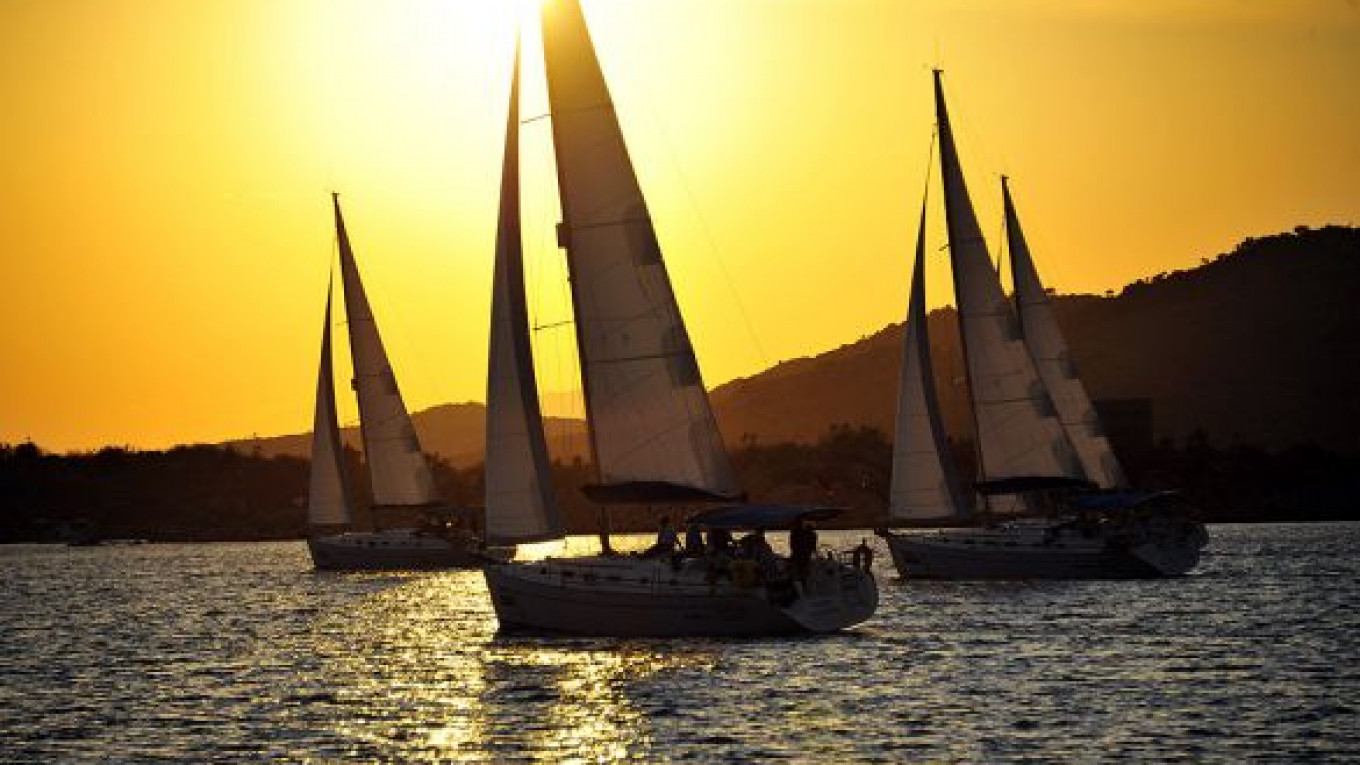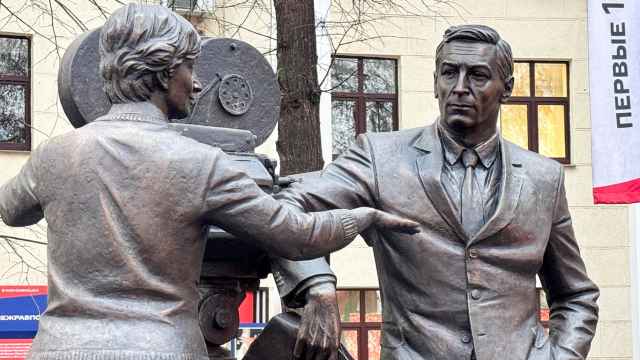OFF THE COAST OF TURKEY, AEGEAN SEA — After a week at sea, you bend your knees to walk safely along the deck. You ask “Who’s the captain?” instead of “Who’s in charge?” and the sea seems to seep into every pore.
Life on the Mediterranean was something new for most of those who took part in Vedomosti’s Captains of Business regatta. Only a handful of the 70 or so businesspeople who took part had ever sailed, but they seized the opportunity during the competition earlier this month, which saw 13 yachts cover about 50 nautical miles of the sparkling Aegean Sea.
The companies, which included National Bank Trust, airline AK Bars Aero and Hyundai, paid about 20,000 euros ($27,000) each to compete in the regatta, which was organized by The Moscow Times, Vedomosti and the Istanbul Sailing Academy.
Excluding a jaunt to the Greek island of Symi, the flotilla hugged a can-opener shaped peninsula in southwest Turkey near the resort town of Marmaris. The terrain was rugged: scruffy, weather-beaten hills flecked with sharp rock outcroppings, and parched, prickly bushes. Stone ruins punctuate the area, a reminder of the region’s long and often inhospitable history, which has seen empire after empire.
From the deck of the Beneteau 43.4s — the Ford Focus of cruising yachts — everything past the spinning winches and sliding ropes seemed serene.
The learning curve for the novice sailors was steep at first. Teams often struggled to communicate with their Turkish, English-speaking captains.
A typical conversation would go:
Captain (In English): “Pull the sails!”
Crew member: “Which sail?”
Captain: “The Genoa!”
Crew to team member in Russian: “Which one is the Genoa?”
Team member: “I don’t know. (In English) Captain, which one is the Genoa?”
With time, however, the crews spent less time trying to remember the new vocabulary and more time at the sails, scrambling back and forth across the deck and growing competent, if not expert, in tightening sheets and splaying mainsails.
The lexicon of leadership is full of sailing terms — Walt Whitman’s lament of Abraham Lincoln, “O Captain! My Captain!” is a rare, unhackneyed example — and some teams showed an evident corollary between success on and off the waves.
The all-female team representing Moscow City Racing, which organizes an annual Formula One race in Moscow, demonstrated teamwork best. They worked hard and efficiently under the guidance of an able captain. No laughing. No lounging. Egos were buried for the good of the team, as when one team member was rotated because she winched too slow.
Like every great sailing tale, the story of the Captains of Business regatta includes a mutiny. Kazan-based AK Bars Aero, the official airline of the event, led the revolt when two crew members took the microphone, on a lovely Monday evening in the shipbuilding village of Bozburun, demanding a new boat because they claimed that theirs was slower than the rest. Hyundai’s Denis Petrunin upped the ante, offering Men’s Health, which had a perfect record of first-place finishes at that point, $1,000 if they could sail his company’s yacht to a top-five finish. Team after team took the microphone in an impressive display of Russian democracy, which like all real republican experiments was nerve-racking and almost got out of control.
A testy exchange ensued before the better angels prevailed. Derk Sauer, chairman of Sanoma Independent Media’s advisory board, declared that he would consult with the lead sailor from the academy and announce a decision on the boat swap the next day.
The evidence that the yachts were unequal was too strong to ignore. For reasons that were only vaguely clear to most of the competitors, some boats were simply faster than others because of the size and quality of the sails, the cleaning of the bottom of the boat of barnacles or the quality of the steering system in use. Some captains were better than others, too, although rumors of ringers with Olympic glory were almost certainly false.
AK Bars Aero was placed on the committee boat, and Men’s Health was stripped of its leader — Russian Olympic sailing team trainer Sergei Dzhiyenbayev — and forced to sail the media boat. This put an end to the revolt, although grumbling continued, and after a disappointing finish in the next stage Men’s Health successfully petitioned for their boat back, going on to sail to the title. Moscow City Racing and Lincoln International finished second and third overall.
Apart from the sailing, there were sunsets to be admired and starry nights with colorful locals, the kitchen staff at the Bozburun hotel danced with cucumbers and ladles in their hands to the disco music outside. There was also a night of dancing on tables and smashing plates, when shards of pottery crunched beneath feet and the ugliest chef twirled the prettiest girl on a table for two.
But the moment I’ll remember best was one in which nothing happened. The wind was finally blowing hard on the open water. We sailed fast, the bow spraying white where it cut the sea, making our way from Bozburun around the spur of the Marmaris Peninsula to Selimiye. I sat next to Guliya Naskayeva of team AK Bars Aero. She told me she was afraid of the deep, and we dangled our legs over the gunwale, which tipped high into the sky as the wind blew through our hair.
At that moment, the boat mistimed a wave and we all got soaked. Then the wind dried us, and flying fish started up again off the port side — two, three, ten at a time, fanning out in 10-second flights, long enough to feel the sun and admire the mechanics of a different world before returning to the sea.
A Message from The Moscow Times:
Dear readers,
We are facing unprecedented challenges. Russia's Prosecutor General's Office has designated The Moscow Times as an "undesirable" organization, criminalizing our work and putting our staff at risk of prosecution. This follows our earlier unjust labeling as a "foreign agent."
These actions are direct attempts to silence independent journalism in Russia. The authorities claim our work "discredits the decisions of the Russian leadership." We see things differently: we strive to provide accurate, unbiased reporting on Russia.
We, the journalists of The Moscow Times, refuse to be silenced. But to continue our work, we need your help.
Your support, no matter how small, makes a world of difference. If you can, please support us monthly starting from just $2. It's quick to set up, and every contribution makes a significant impact.
By supporting The Moscow Times, you're defending open, independent journalism in the face of repression. Thank you for standing with us.
Remind me later.






